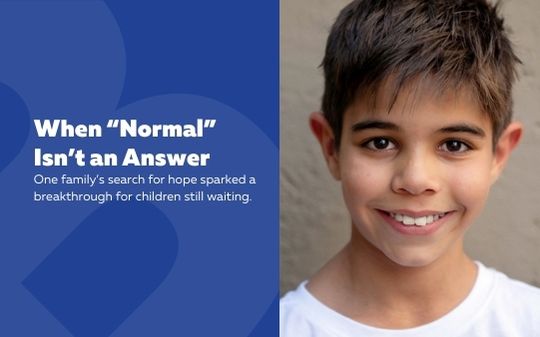
by Tessa Van Rensberg | Feb 9, 2026 | Medical Fundraising
“The scan is normal.”
For most parents, those words would bring relief. For Matthew and Jenny Sanan, they became the most frightening sentence they would hear again and again.
Because when your child is still having seizures, sometimes dozens a day, “normal” doesn’t mean healthy. It means unanswered questions. It means living in the dark.
This is the reality that the Sanan family and their son, Declan, have lived with for the past ten years.
Meet Declan
Declan (soon to be 12 in May this year) is the bravest person his parents know, but more than that, he is kind.
He has a warm, gentle nature, the kind that draws people in instantly. He loves playing Fortnite and Roblox, practises Taekwondo, and has a quiet determination that defines who he is. His parents describe his greatest strength simply as “trying.”
Declan has seizures. He recovers. And then he gets up and wants to carry on living. “That’s his superpower,” Matthew says. “He never gives up.”
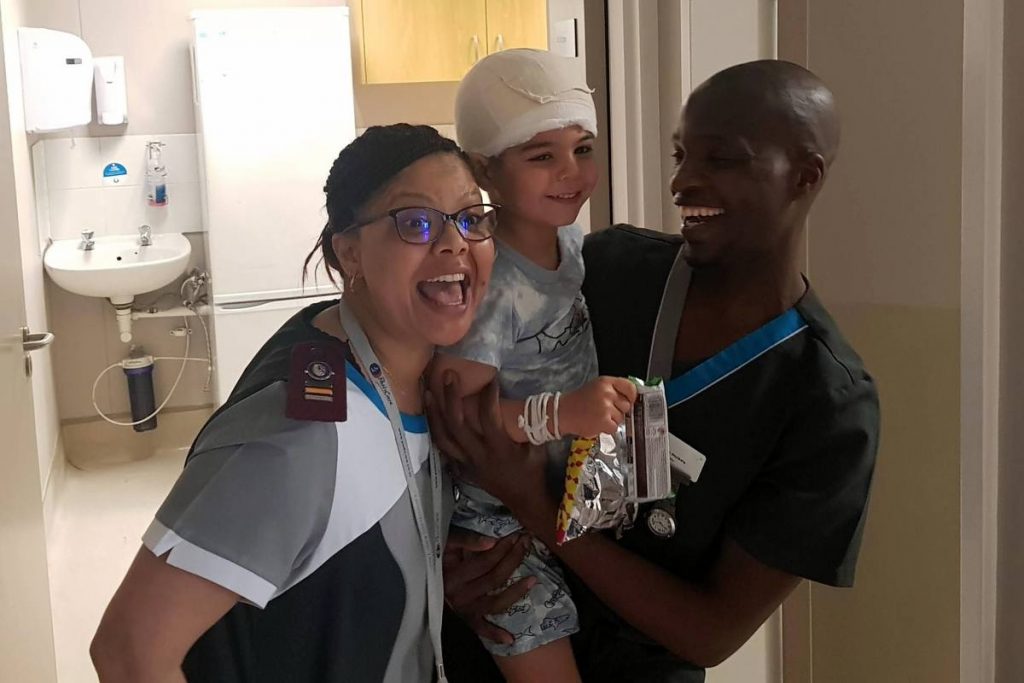
A Childhood Marked by Waiting
Declan’s seizures began when he was just two years old.
What followed was a decade of searching, endless hospital visits, tests, scans, genetic investigations, and late nights filled with fear and exhaustion. Each seizure brought the same unspoken question: What damage is this doing?
And still, the answers never came.
“You live with this constant, quiet desperation,” the couple explains. “You’re always hoping the next doctor might see something the others missed.”
But scan after scan came back the same. Normal.
Why ‘Normal’ Was the Hardest Result
People assume a normal scan is good news. For families like Declan’s, it’s the opposite.
“When your child is suffering, ‘normal’ just means we don’t know what’s wrong,” Matthew says. “Finding something, even something scary, would have given us hope. It would have meant there was a target. An end in sight.”
Instead, normal meant waiting. And darkness.
A Breakthrough That Changed Everything
Late one night, driven by desperation and hope in equal measure, Matthew searched online for new answers. He typed in four words: “AI in epilepsy.”
That search led him to the MELD Project, an experimental research initiative overseas. Matthew shared Declan’s story and sent through his son’s scans, scans that had been called “perfect” for years.
The first response came back uncertain. A low-confidence signal. Matthew thanked them, then mentioned something else: Declan had undergone seven MRIs over his lifetime. Could they look at all of them?
Weeks later, the answer came. The same hidden signal appeared in five out of seven scans.
Without showing the AI results, the team shared Declan’s scans with a world-renowned specialist. He spotted it too, becoming the first human to see what had been missed for a decade.
For the first time, there was clarity. For the first time, there was a plan.
From One Child to Many
That moment changed everything.
“If technology could find something that had been missed for ten years,” Matthew realised, “how many other children are still sitting with ‘normal’ scans, waiting in the dark?”
That question became the heart of Project Unseen.
Matthew began building his own system, not as a finished solution, but as a foundation. A way to give doctors another set of eyes. A way to help turn “incurable” into “treatable.”
Why the Community Stepped In
The technology needed to do this work isn’t simple, or cheap. It requires serious computing power, far beyond what most families or hospitals can access.
Matthew made a deliberate choice: instead of keeping this work overseas or private, he turned to the community. Crowdfunding allowed Project Unseen to be built here, for South African patients, alongside local doctors and researchers.
And the response was extraordinary.
The campaign didn’t just reach its goal, it surpassed it, raising over R200,000 from people who believed in the possibility of change. Every cent will be paid directly to the equipment supplier. The machine itself will be a shared community resource, dedicated to helping doctors flag what the human eye might miss.
What Hope Looks Like Now
Project Unseen is still in its early stages. Matthew is careful to manage expectations.
“This isn’t a finished tool yet,” he says. “Right now, I’m building the engine.”
But the vision is clear: a future where families don’t wait ten years for answers. Where “normal” doesn’t end the conversation. Where hope arrives sooner.
For parents still searching, Matthew and Jenny have one message:
“Pray. Trust your gut. If you feel there’s an answer out there, don’t stop looking. Technology is moving fast, and there is always hope.”
Turning the Lights On
Declan’s journey is still unfolding. Plans are being made. Steps are being taken. But because of one child, one family, and a community that chose to believe, the lights are beginning to turn on for others too.
Learn more about Project Unseen or follow its progress here: https://www.backabuddy.co.za/campaign/project-unseen-ai-for-invisible-epilepsy
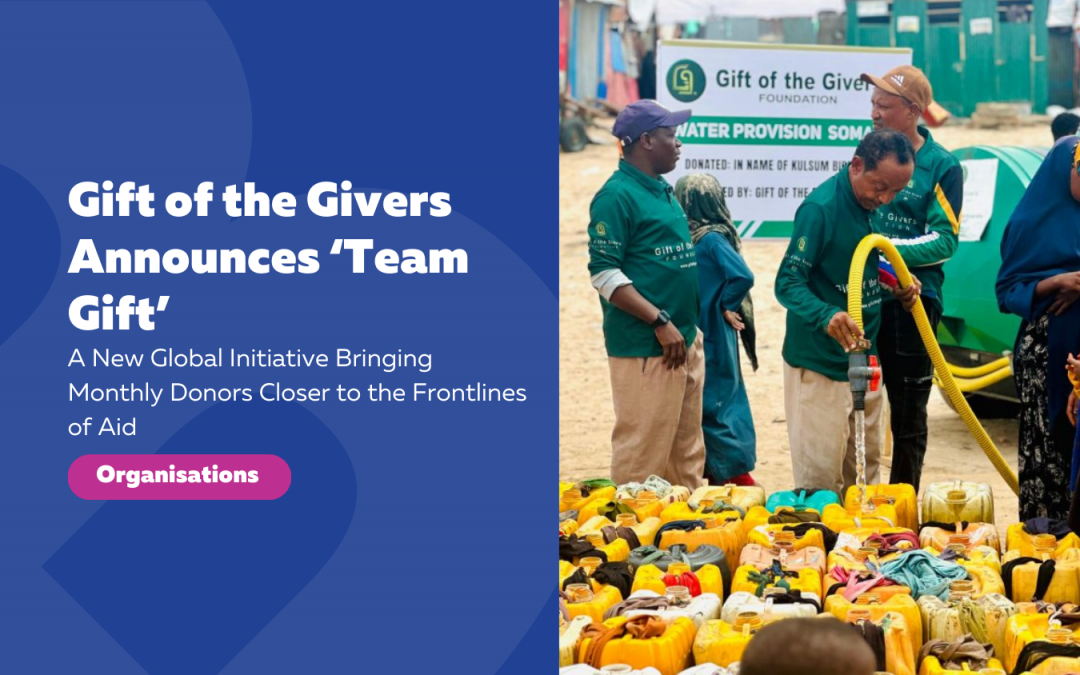
by Tessa Van Rensberg | Nov 12, 2025 | Organisations
Photo credits: Gift of the Givers
Building Sustainable Support for Those Who Need It Most
[Cape Town, 11 November 2025] — Gift of the Givers has announced the launch of Team Gift, a new monthly giving programme powered by BackaBuddy, designed to generate steady and sustainable support for their life-saving humanitarian work both locally and across the globe.
In a world where crises strike more often and with growing intensity, from conflict and hunger to drought and disaster, Team Gift gives ordinary South Africans a way to stand together consistently, ensuring no one is left behind when hardship hits.
Hope That Never Fades
Disasters, poverty, and limited access to healthcare continue to affect millions each year. Team Gift was created to provide consistent, reliable support, ensuring that when emergencies arise, help can arrive without delay.
The programme’s sustainable funding model allows Gift of the Givers to respond faster, plan further ahead, and maintain essential care long after initial relief efforts have ended.
From a Riverbed in Mozambique to a Movement of Hope
The inspiration behind Team Gift reaches back to 1990, when a young Dr Imtiaz Sooliman travelled with the Islamic Medical Association to Mozambique during a time of war and drought.
While visiting Nacala Hospital, he noticed two frail children digging into a dry riverbed and drinking the muddy water that seeped through the soil. The image stayed with him, a painful reminder of how easily we take clean water and safety for granted, and how deeply ordinary people can suffer in times of crisis.
Determined to act, Dr Sooliman wrote about what he had witnessed and shared it through phone calls and fax machines, his version of crowdfunding at the time. Within just five days, friends and colleagues helped him raise $100 000 (USD), enough to provide 30 boreholes and vital malaria medication.
That first humanitarian mission became the foundation for Gift of the Givers, proving that when people unite around compassion, extraordinary things happen.
Today, more than three decades later, that same spirit of unity and collective giving lives on through Team Gift, a call for South Africans to join a community of monthly donors ensuring the organisation remains ready to respond whenever and wherever help is needed.
How Team Gift Works
From as little as R50 per month, donors can pledge recurring contributions via BackaBuddy, joining a growing global movement of consistent givers. All donations are pooled and distributed across Gift of the Givers’ key humanitarian projects, supporting food security, sanitation, healthcare, education, disaster response, and more.
Because the funding is stable and recurring, Gift of the Givers can plan ahead, reach further into crisis zones, and sustain life-saving support long after the headlines fade.
To celebrate the spirit of collective compassion, the organisation is calling on supporters around the world to be among the first 1 000 members of Team Gift — a founding community of monthly donors recognised for their commitment to ongoing, measurable impact.
Founding Member Benefits
When individuals join Team Gift as Founding Members, they will gain access to a range of exclusive benefits designed to bring them closer to the organisation’s life-saving work.
Founding Members will receive live, real-time updates through the Team Gift WhatsApp Community, including direct messages, photos, and videos from Gift of the Givers’ relief teams on the ground, offering a rare, behind-the-scenes view of humanitarian action in progress.

Photo credits: Gift of the Givers
Why Now
Unpredictable crises demand reliable compassion. Too often, projects fade once immediate relief ends, leaving communities vulnerable. Team Gift closes that gap, turning one-time generosity into continuous care.
Ronelle Mungaroo, Communications Manager at Gift of the Givers, explains:
“Team Gift represents the heart of our mission — a community of consistent givers who ensure that when the next crisis arrives, we are already prepared. Every monthly donation, no matter the size, helps sustain the lifeline that keeps hope alive.”
Catherine Swanepoel, Chief Growth Officer at BackaBuddy, adds:
“Recurring giving is one of the most powerful ways South Africans can make an impact. Through Team Gift, BackaBuddy is proud to support Gift of the Givers in building a community of everyday heroes who make long-term humanitarian work possible.”
Join Team Gift, Become a Founding Member
Gift of the Givers and BackaBuddy invite South Africans to transform compassion into action by joining Team Gift today.
About Gift of the Givers
Founded in 1992, Gift of the Givers is Africa’s largest disaster response NGO. The organisation has delivered more than R6 billion in humanitarian aid across 47 countries. Its wide-ranging projects include food security, water provision, healthcare, education, and disaster relief, as well as infrastructure improvements in disadvantaged South African schools and rapid local disaster response efforts that strengthen resilience at home and abroad.
The Gift of the Givers Foundation is the largest disaster-response non-governmental organisation of African origin on the African continent. The essence of its presence is to bring hope and restore dignity to the most vulnerable.
About BackaBuddy
BackaBuddy is South Africa’s leading crowdfunding platform, enabling individuals and organisations to raise funds securely for causes they care about.
Since its inception, BackaBuddy has helped raise over R610 million for thousands of campaigns across South Africa — supporting individuals, families, and charities in times of need.
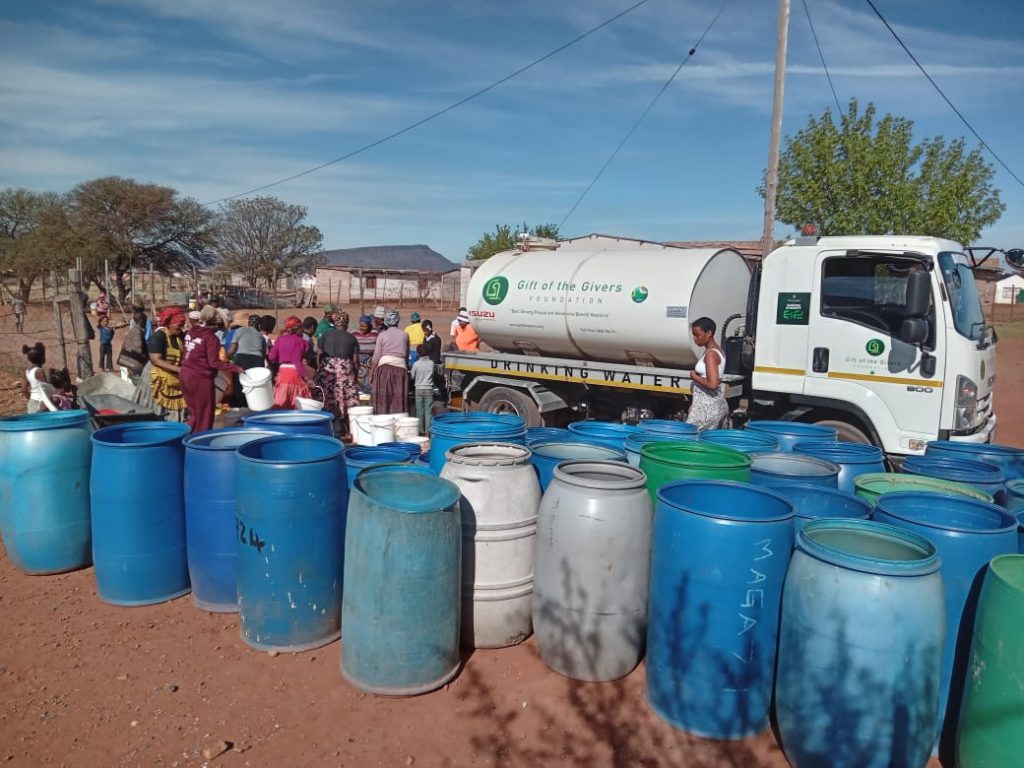
Photo credits: Gift of the Givers
By powering recurring donations, BackaBuddy helps South Africans sustain meaningful change and provide steady support for critical initiatives like Team Gift.

by Tessa Van Rensberg | Nov 12, 2025 | Organisations
The South African Depression and Anxiety Group (SADAG),
A beacon of hope for countless individuals, is based in South Africa – its impact reaches across every province, home, and heart that has ever faced the darkness of mental illness. For over 31 years, SADAG has been the country’s leading mental health NGO, answering calls for help every day and night of the year. Through donations, and crowdfunding, BackaBuddy has partnered with SADAG , in an effort to help raise awareness around mental health and the amazing work the organisation does.
Answering the Call for Help
For SADAG, every ring of the phone represents a life – someone in crisis, reaching out as a attempt to be seen, to be heard, to be saved. Their
24-hour Suicide Crisis Helplines are often the only lifeline for thousands of South Africans who find themselves in moments of despair
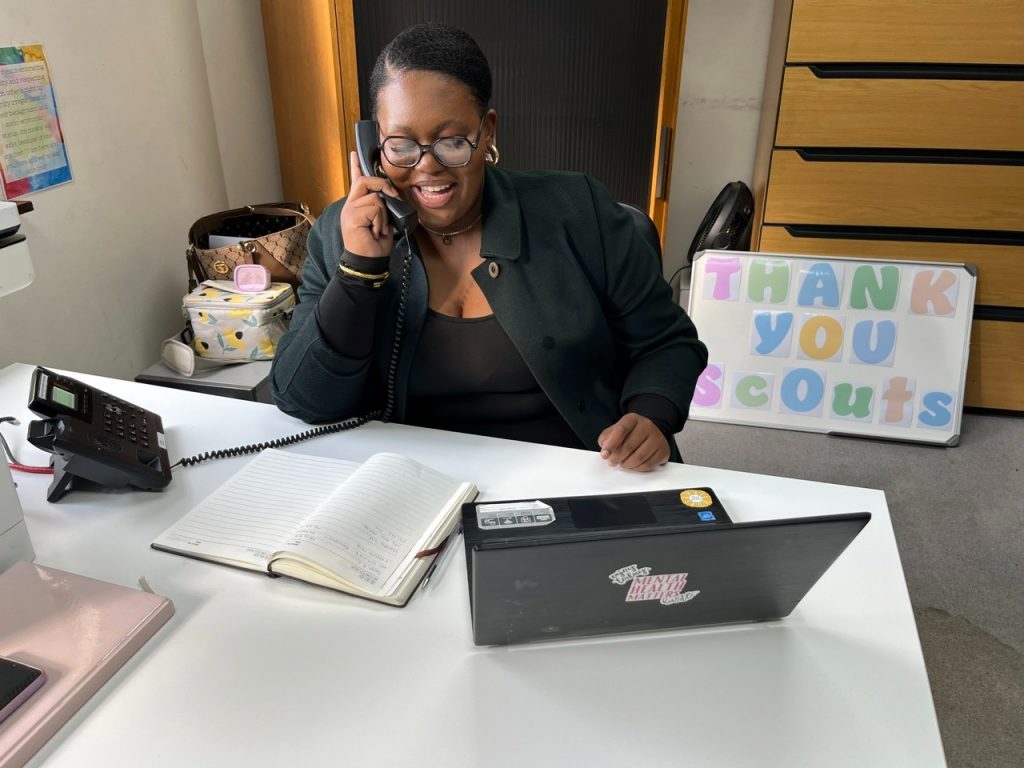
As SADAG’s Development Manager, Fatima Seedat, explains, “‘Answer The Call for Help’ means more than picking up a phone – it’s about showing up for someone at the exact moment they feel invisible, hopeless, or alone.”
Every month, SADAG faces the monumental task of keeping their helplines open. Their operating costs reach R180,000, ensuring that trained counsellors can continue to provide free, compassionate support to every caller. To sustain this service, they’ve launched a crowdfunding campaign on BackaBuddy, aptly titled “Answer The Call for Help”, which has already raised over R12,610 from 24 generous donors.
Each contribution, no matter how small, keeps hope alive.
As Fatima shared, “When a caller is ready to end their life, that one answered call can change everything.”
She recounts the story of a young man who phoned them one night, moments away from taking his own life. The counsellor’s gentle patience and empathy turned that moment of despair into survival – saving his life through connection, compassion, and care.
A Partnership for Hope
For BackaBuddy, partnering with SADAG is not just a collaboration – it’s a commitment to compassion. The platform, known for connecting everyday heroes with causes that matter, has joined forces with SADAG to help raise both funds and awareness for mental health.
This partnership underscores a shared mission: ensuring that no person’s cry for help goes unanswered. Together, they aim to break the silence surrounding mental health and inspire South Africans to take part in the movement – by donating, crowdfunding, or simply showing kindness.
As SADAG puts it, “Through this collaboration, every donation becomes part of something bigger: a shared effort to ensure that no cry for help goes unanswered. But it’s not only the callers who benefit — giving and extending kindness also nurtures the giver’s own mental wellbeing.”
The Healing Power of Giving
Science agrees: giving is good for your mental health. Acts of generosity – from volunteering to donating – trigger the release of endorphins, dopamine, and oxytocin, often called the “happiness hormones.” These natural chemicals help reduce stress, combat anxiety, and foster a deeper sense of connection.
It’s what BackaBuddy calls “Growing Givers” – the idea that when you give, you grow. Giving to SADAG isn’t just about keeping the phone lines open; it’s also about creating ripples of kindness that heal both the receiver and the giver. As SADAG notes,
“When you help someone, you also help yourself.”
Becoming a Champion for Mental Health
Anyone, anywhere in South Africa, can become a champion for SADAG on BackaBuddy. You don’t have to be a counsellor to save lives – you can host a charity run, arrange an awareness day, and then back your efforts with a BackBuddy campaign. Every initiative contributes to a collective promise: that every call for help will be answered.
And for those who are struggling themselves, SADAG offers this reminder:
“Reach out for help if you need it, even if it’s just to say, ‘I’m not okay.’ Answering the call doesn’t always mean being on the helpline – sometimes it’s simply choosing kindness, choosing connection, choosing to care.”
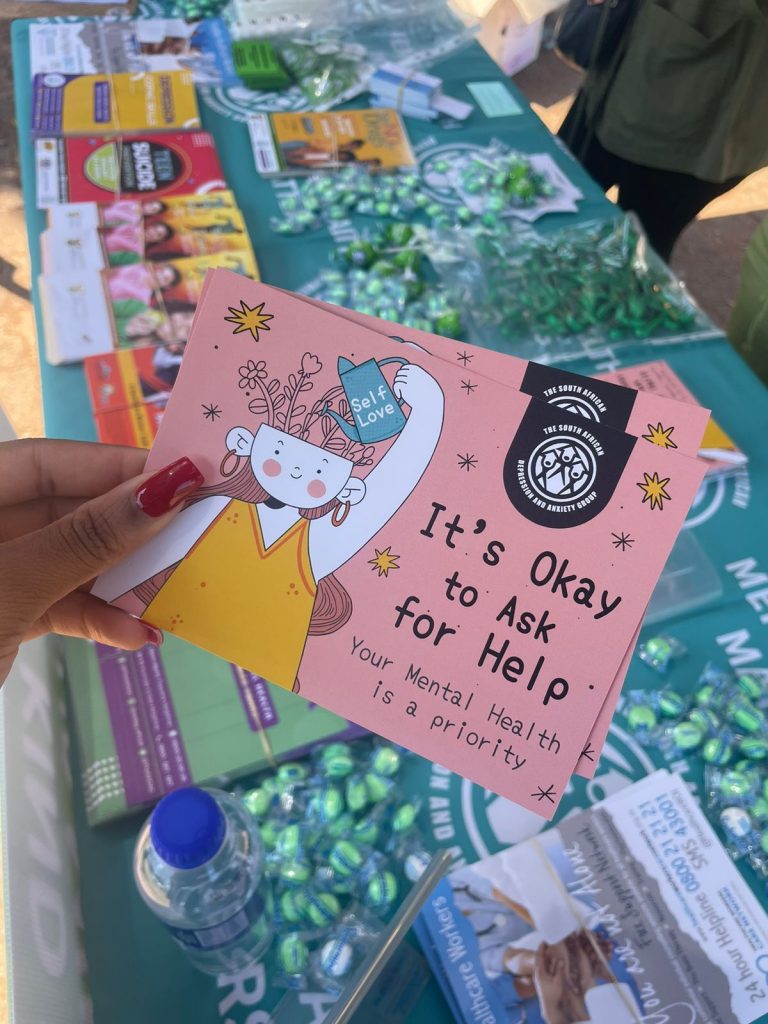
A Shared Mission of Hope
In a world where so many feel unseen, this partnership between SADAG and BackaBuddy represents unity, hope, and humanity at its best, reminding South Africans that compassion is a strength – and that through giving, we not only lift others, but we lift ourselves.
To support SADAG, visit their BackaBuddy campaign link here:
👉 https://www.backabuddy.co.za/campaign/answer-the-call-for-hope
Share the story, donate if you can – even as little as R50 can save a life – and help ensure that no call for help ever goes unanswered.
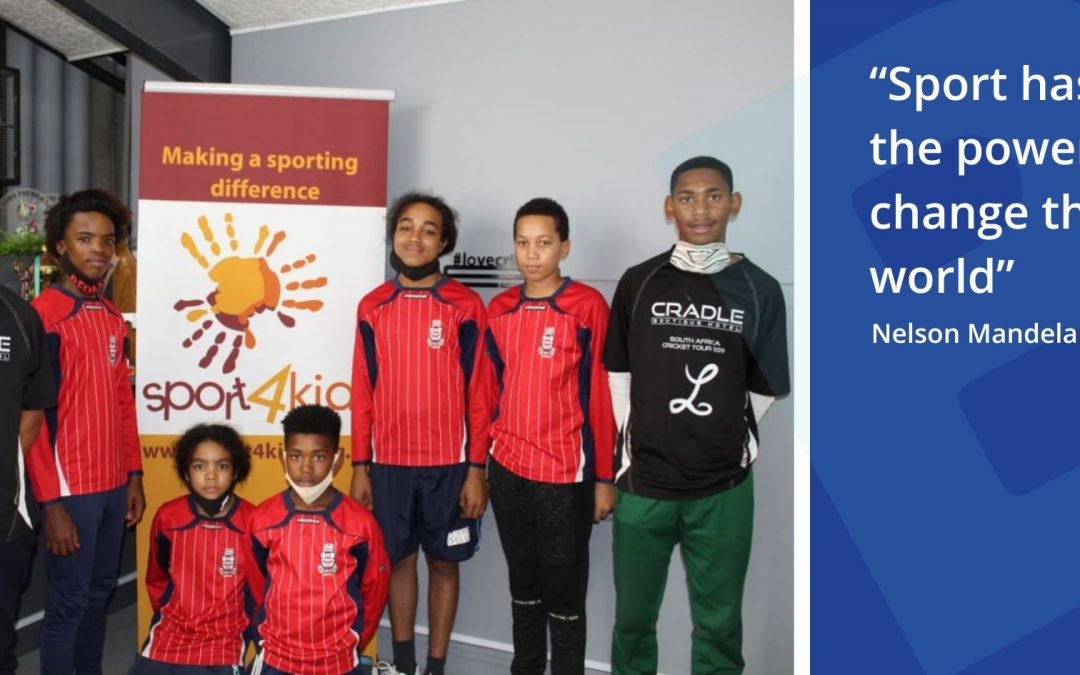
by Tessa Van Rensberg | Oct 28, 2025 | Organisations
Andrew Russell (61) from Cape Town, Western Cape
For as long as he can remember, sport has been more than just a game for Andrew Russell – it’s been a language of hope, connection, and opportunity. Today, as the director and co-founder of sport4kids, Andrew has dedicated nearly two decades to ensuring that children from underserved communities can experience that same joy and belonging that the power of sport brought into his own life.
Through sport4kids, a non-profit organisation he started in 2006 with David and Jenny MacGregor, Andrew is helping rewrite the stories of children who might otherwise have been left on the sidelines. Their mission is simple yet profound: to give every child a chance to play – regardless of their financial background.
From the Field to the Heart
Andrew’s love for sport began in his early school days.
“I played everything I could – cricket, rugby, you name it,” he recalls fondly.
After studying, he spent eight years teaching and coaching at a high school before venturing into sports tourism. In 2000, he founded Cape Africa Tours, bringing sports teams from around the world to South Africa.
It was during these tours that Andrew began noticing a heartbreaking reality.
“Many of the local kids had incredible talent but no access – no kit, no coaching, and often, no transport,” he says.
Visiting teams would sometimes leave behind their equipment, and Andrew would distribute it to local schools. But the need was far greater than a few extra cricket bats or soccer balls. That realisation sparked the birth of sport4kids.
Since its founding, the organisation has helped hundreds of children participate in sports by providing them with equipment, uniforms, and access to coaching.
“We’ve seen shy, uncertain kids transform into confident young athletes,” Andrew explains. “Sport teaches teamwork, resilience, and belief – lessons that last long after the final whistle.”
A Vehicle of Hope
One of the organisation’s proudest moments came in 2016 when Westminster Under School in London raised funds for a 14-seater Toyota Quantum – a vehicle that became the beating heart of the programme.
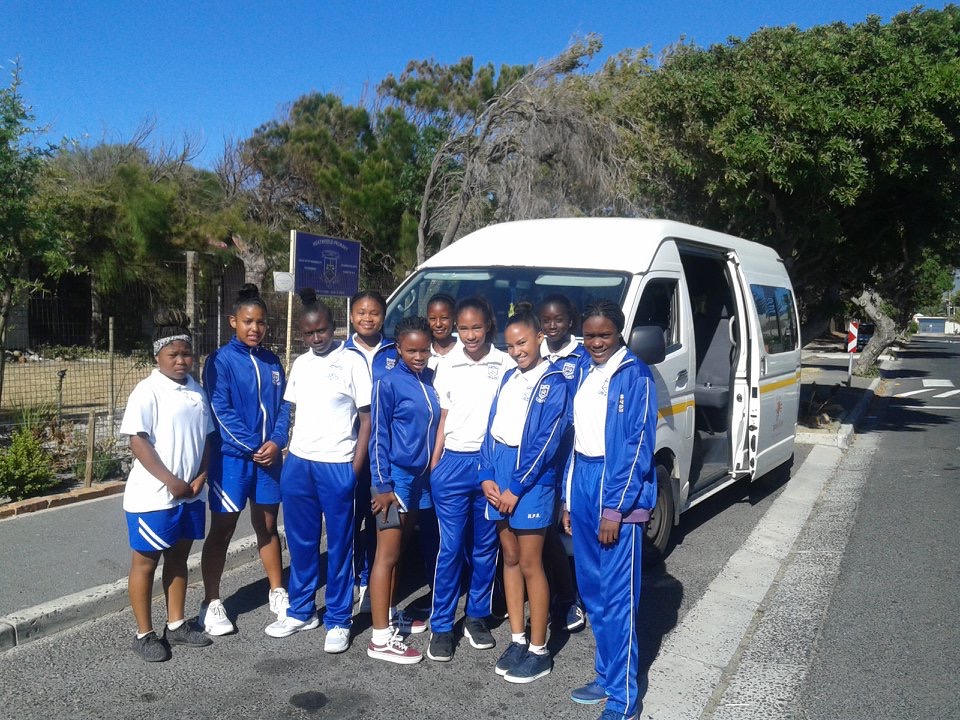
“That van has transported countless children to practices, matches, and tournaments they otherwise would have missed,” says Andrew. “Without it, hundreds of fixtures would simply not have happened.”
But sustaining this vital service has become increasingly difficult. Rising fuel costs, maintenance fees, and the need for more sports gear have stretched their resources thin.
“Right now, we’re in urgent need of support to keep the vehicle running and ensure no child misses their shot at playing,” he adds.
In June 2025, Andrew launched a crowdfunding campaign on BackaBuddy, aptly titled ‘The Power of Sport’, to raise R250,000 for kits, equipment, and vehicle maintenance. So far, 10 donors have contributed R5,783.50, but the journey ahead remains long.
Yet Andrew remains hopeful.
“Every small donation truly helps,” he says. “A cricket bat or soccer ball might seem small, but for a child who’s never owned one, it means the world.”
Sport as a Lifeline for Mental Health
Beyond the physical benefits, Andrew believes sport has the power to nurture mental well-being and community belonging – something especially vital for South African youth.
“Sport gives kids a purpose, a sense of identity,” he explains. “It keeps them off the streets, away from dangerous paths, and helps them believe they belong to something bigger than themselves.”
He recalls one story that has stayed with him over the years: a young boy named Nathan, who received a scholarship to attend Plumstead High School through sport4kids.
“Nathan was sport-crazy and full of potential,” says Andrew proudly. “Today, he’s involved in coaching and giving back to other young athletes – proof of how the ripple effect of opportunity can change lives.”
For Andrew, these moments make every challenge worth it. “When a parent comes up to you after a match, with tears in their eyes, thanking you for believing in their child – that’s when you realise this work matters,” he says.
The Future: Building Champions On and Off the Field
Looking ahead, Andrew envisions a thriving network of empowered children and communities who see sport not as a luxury, but as a right.
“In ten years, I hope sport4kids will be bigger, stronger, and reaching even more schools across South Africa,” he says. “I don’t ever want to see another talented child sit out simply because they couldn’t afford to play.”
He also expresses deep gratitude to those who have already supported the cause.
“We’re incredibly thankful to everyone who’s donated and cheered us on thus far,” he says. “You’re not just funding sport – you’re giving kids hope, structure, and a reason to dream.”
As Nelson Mandela once said, “Sport has the power to change the world.” For Andrew Russell and his team, those words aren’t just a quote – they’re a calling.
Keeping the Power of Sport Alive
For many children in Cape Town, sport4kids isn’t just about games – it’s about belonging, confidence, and healing. The organisation’s impact extends far beyond the playing field, fostering community, inclusion, and positive mental health.
Through his BackaBuddy campaign, Andrew hopes that more South Africans will recognise how even the smallest act of generosity can spark enormous change. “It doesn’t take a lot to make a difference,” he says. “Every bit counts – and together, we can keep the power of sport alive.”
To support Andrew and sport4kids, visit their BackaBuddy campaign link here:
👉 https://www.backabuddy.co.za/campaign/the-power-of-sport
Share their story and help bring the joy of sport – and hope – to more children across South Africa.
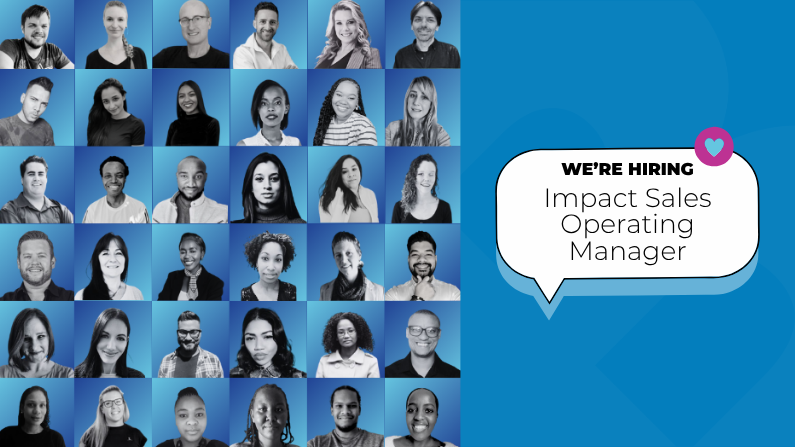
by Community | Oct 27, 2025 | Careers
Impact Sales Operating Manager
Location: Remote / Cape Town preferred
Level: Manco
Salary: Depending on experience between R60 000 to R80 000 per month
Reports to: Chief Growth Officer (Exco – Catherine Swanepoel)
Start date: Q1 2026
About BackaBuddy
If you are a high-performance sales team manager who has successfully delivered in leading a distributed team of sales agents using significant integration of CRM toolkits AND you want to engage those skills for nation-wide purpose-driven impact, then you’re the right person for this position.
We are BackaBuddy. We’re the leaders in our field of crowdfunding. Our target, to be the leaders in Africa, and we’re building the team to achieve it. Every month, we enable 1,000s of people and organisations to raise the funds they need from 10,000s of people. We are looking for ‘the’ person who will operationally lead the impact sales team as we target 10x impact growth over the next 3 years.
Role Overview
The Impact Sales Operating Manager will lead the sales function implementation — build the internal team and the structures that empower an external volunteer army of fundraisers to succeed.
It is a highly operational leadership role, reporting directly to our Chief Growth Officer (CGO) at Exco level. You will work closely with the CGO to co-develop the growth strategy and take full ownership of its implementation across the department.
What makes this role unusual is that your internal team of 8–9 people will only be the core of traditional sales to fundraisers — beyond this, your job is to support, equip, and activate 1000s of external fundraisers (mostly individuals) who each act as their own dedicated sales agents for their campaigns during short, high-intensity fundraising windows.
In many ways, this structure is similar to straight commercial sales models:
- Insurance agency models (central team supporting independent agents)
- Real estate group models (central team supporting individual agents)
- Airbnb hosts (a central platform providing toolkits to support hosts)
Key Responsibilities
Strategic Implementation and Leadership
- Partner with the CGO to set and execute quarterly and annual sales/growth objectives.
- Translate vision into measurable plans, OKRs, and team accountability frameworks.
- Lead the sales/growth function with a focus on scalable systems and performance outcomes.
Internal Team Management and Cross-functional Alignment
- Lead and align the Charities, Portfolio Management, and Campaign Success teams to deliver exceptional support for thousands of active campaign creators.
- Foster collaboration across marketing, tech, and customer success to streamline campaigner experience.
- Build a culture of learning through feedback loops and shared knowledge.
Equip an ‘army’ of 1,000s – develop Systems, Toolkits and Knowledge Infrastructure
- Develop scalable toolkits, playbooks, templates, and automations that drive campaign success.
- Design and test resources to maximise fundraising results within the key 3-week campaign window.
Reporting and Performance Management
- Establish dashboards and reporting to track performance, success rates, and bottlenecks.
- Deliver regular performance insights and improvement recommendations to senior leadership.
Ideal Candidate Profile
Skills and Experience
- 5+ years in sales operations, growth, or channel management, ideally leading distributed teams or partner networks.
- Skilled in building scalable enablement systems (toolkits, playbooks, training).
- Proven leader with strong KPI delivery and cross-functional collaboration.
- Experience in platforms, marketplaces, or fundraising environments is a plus.
- Proficient with CRM (Zoho), project management, and reporting tools.
Mindset and Attributes
- Purpose-driven, empathetic, and passionate about people-powered impact.
- Systems thinker who thrives on scale, structure, and rapid execution.
- Blends strategic vision with hands-on leadership.
- Understands that sales is storytelling — inspiring belief and action.
Why Join BackaBuddy?
This is an opportunity to help tens of thousands of campaigners raise funds for what matters most to them — while shaping the systems and team that support them. You will operate at the heart of a platform where real-world impact happens fast, and your work translates directly into lives changed.
If you have led distributed sales networks, supported gig-economy workers, or enabled communities at scale — and you want your work to matter — this role was made for you.
How to Apply
To apply, please submit your CV and a cover video (with transcript) telling us why you think you’re ‘the one we need’ to [email protected].
Why We Love What We Do
“At BackaBuddy, we believe people are most powerful when we work together.
That’s the heart of your role — to enable thousands of individuals and organisations to turn compassion into funds raised. You’ll create toolkits that guide, support, and advise campaign creators as they launch their fundraisers, run them effectively, and raise the funds they need for what truly matters in the world. Your work will empower everyday people to make extraordinary change”
Patrick Schofield, CEO
“We’re at a point where structure meets soul — where operational excellence unlocks human potential. If you love building systems that empower others to succeed, and you care deeply about the ‘why’ behind the work, this is where you’ll thrive.”
Catherine Du Plooy, CGO
“I’ve been at BackaBuddy for almost 9 years. It’s incredible to be a part of a company that allows you to have a positive impact on the lives of the people around you, as well as the wider world. One of the things I am most proud of at BackaBuddy, is our warm, friendly and respectful work culture, that will allow you to grow both personally and professionally.”
Zane Groenewald, Head of Campaign Marketing and Strategy











